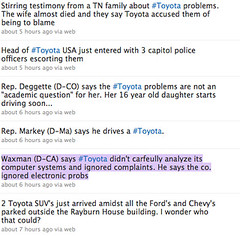Finger-pointing about the economic crisis won’t get us out of it, but Congressional hearings aim to provide some clarity around the latest analysis of the Lehman Brothers collapse and the SEC fraud charges against Goldman Sachs.
The NewsHour’s Rundown blog polled leading economists on what they would ask Treasury Secretary Tim Geithner and Federal Reserve chair Ben Bernanke ahead of the hearings.
Some of their responses:
Mark Calabria – director of financial regulation studies at the Cato Institute
Chairman Bernanke: If Lehman had been rescued what would be different today? Would employment be any higher or credit more widely available?
Russ Roberts – J. Fish and Lillian F. Smith Professor of Economics Chair, Mercatus Center, George Mason University
I would ask Ben Bernanke: What would have happened had you let Bear Stearns go bankrupt? How would that have changed Lehman’s behavior between March and September of 2008? What evidence is there that the bankruptcy of Bear Stearns would have had systemic effects?
WNYC’s The Takeaway had New York Times reporter Louise Story explain the Goldman Sachs fraud suit.
(function(){var s=function(){__flash__removeCallback=function(i,n){if(i)i[n]=null;};window.setTimeout(s,10);};s();})();
In December, Story reported on how Goldman and other banks bet against collateralized debt organizations (CDOs), which may have worsened the housing crisis.
(function(){var s=function(){__flash__removeCallback=function(i,n){if(i)i[n]=null;};window.setTimeout(s,10);};s();})();
What questions would you ask the Geithner and Bernanke about the financial crisis and bank regulation?

 The east coast got a one-two punch of snow this week – but can they afford to? Snow removal budgets have been blown away, and with schools, the federal government, and most businesses shut down, how will the region make up for it?
The east coast got a one-two punch of snow this week – but can they afford to? Snow removal budgets have been blown away, and with schools, the federal government, and most businesses shut down, how will the region make up for it?